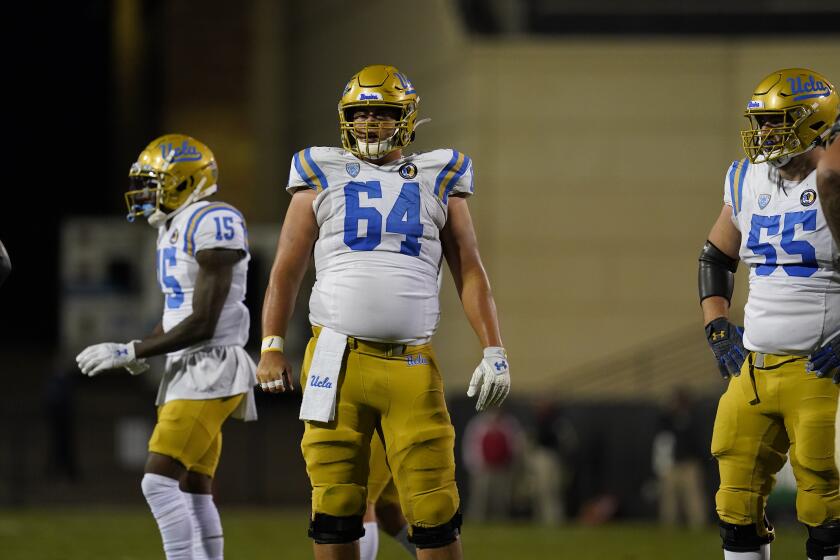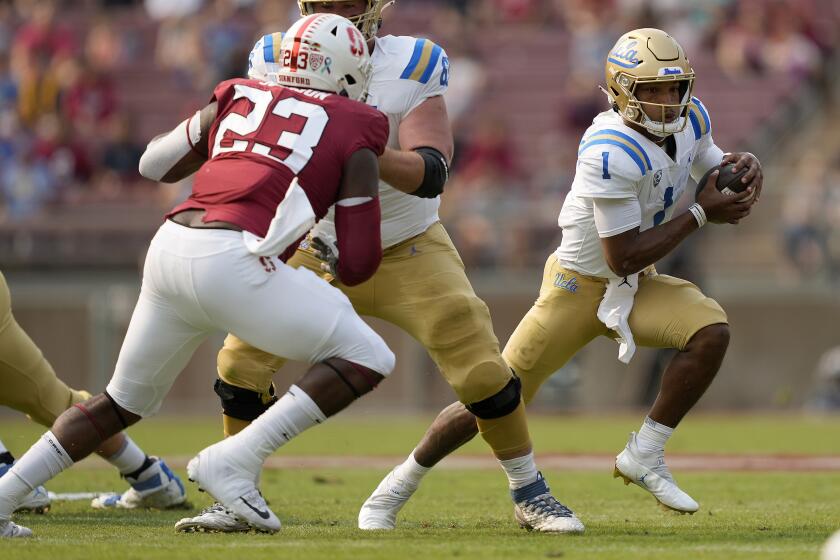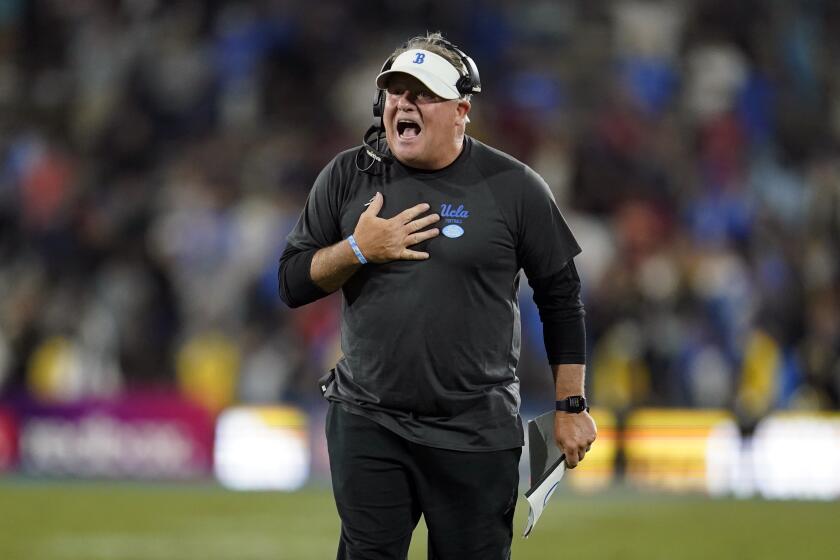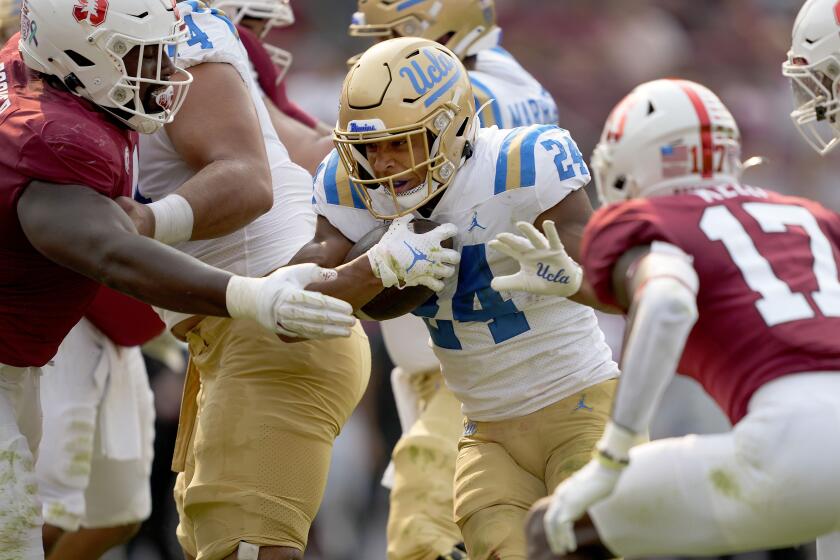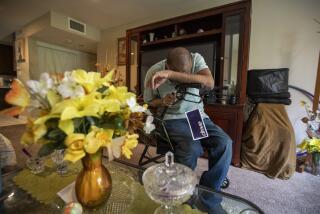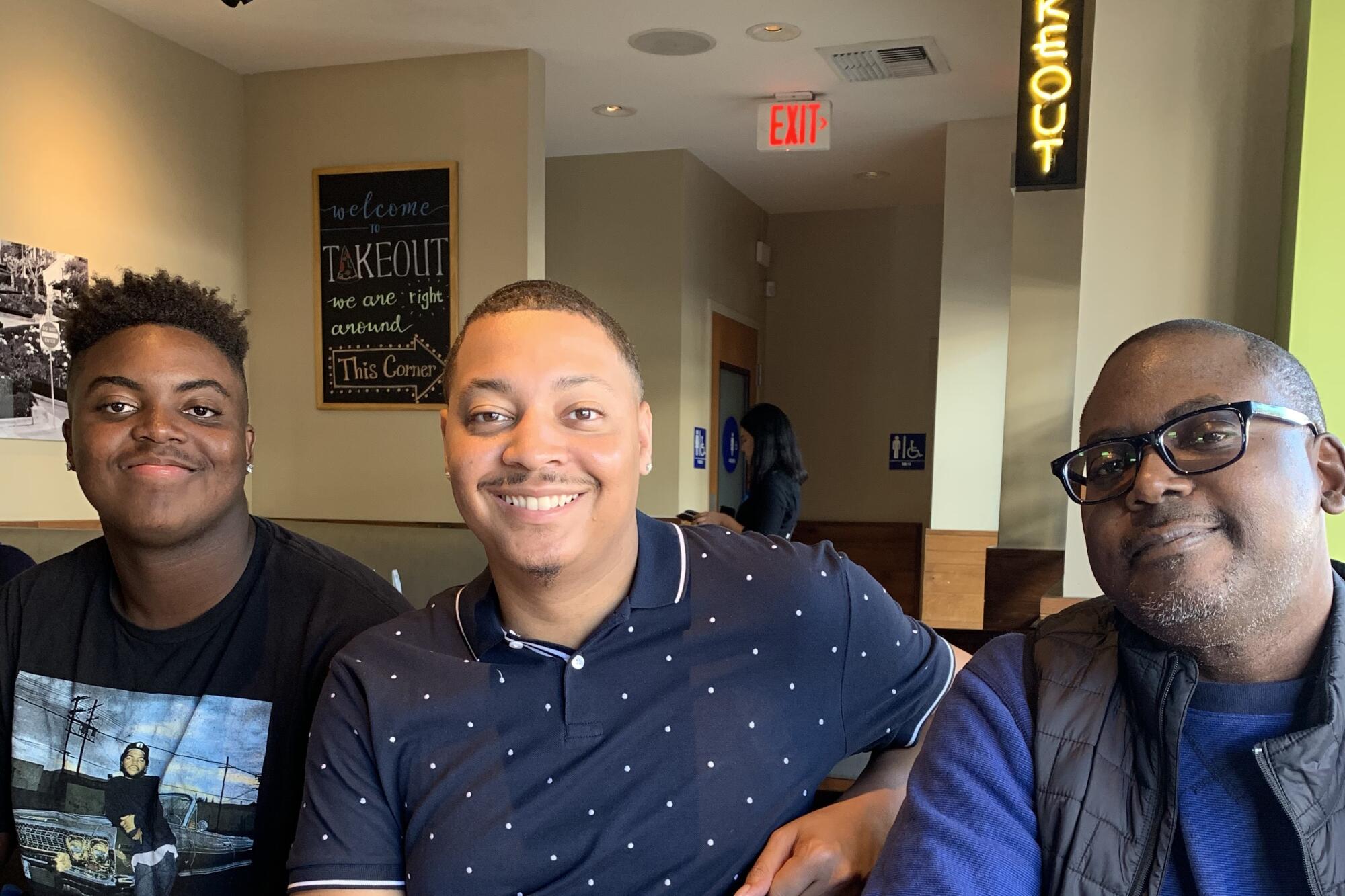
Traveling from his Wisconsin home to watch the son who bears his name play football requires a dreaded pregame routine. On the day before he eases into his Rose Bowl seat, Jon Gaines must endure four restless hours in what he’s dubbed “the chair.”
Two needles are inserted into his left arm, roughly three inches apart. One needle goes into a vein to extract blood and the other into an artery to return it after it’s been cleansed of toxins and excess fluids.
Every time he feels the needle pricks, the father of UCLA center Jon Gaines II falls into an immediate funk.
“It’s like a mini-five-minute depression,” he said, “like, I still can’t believe this is happening.”
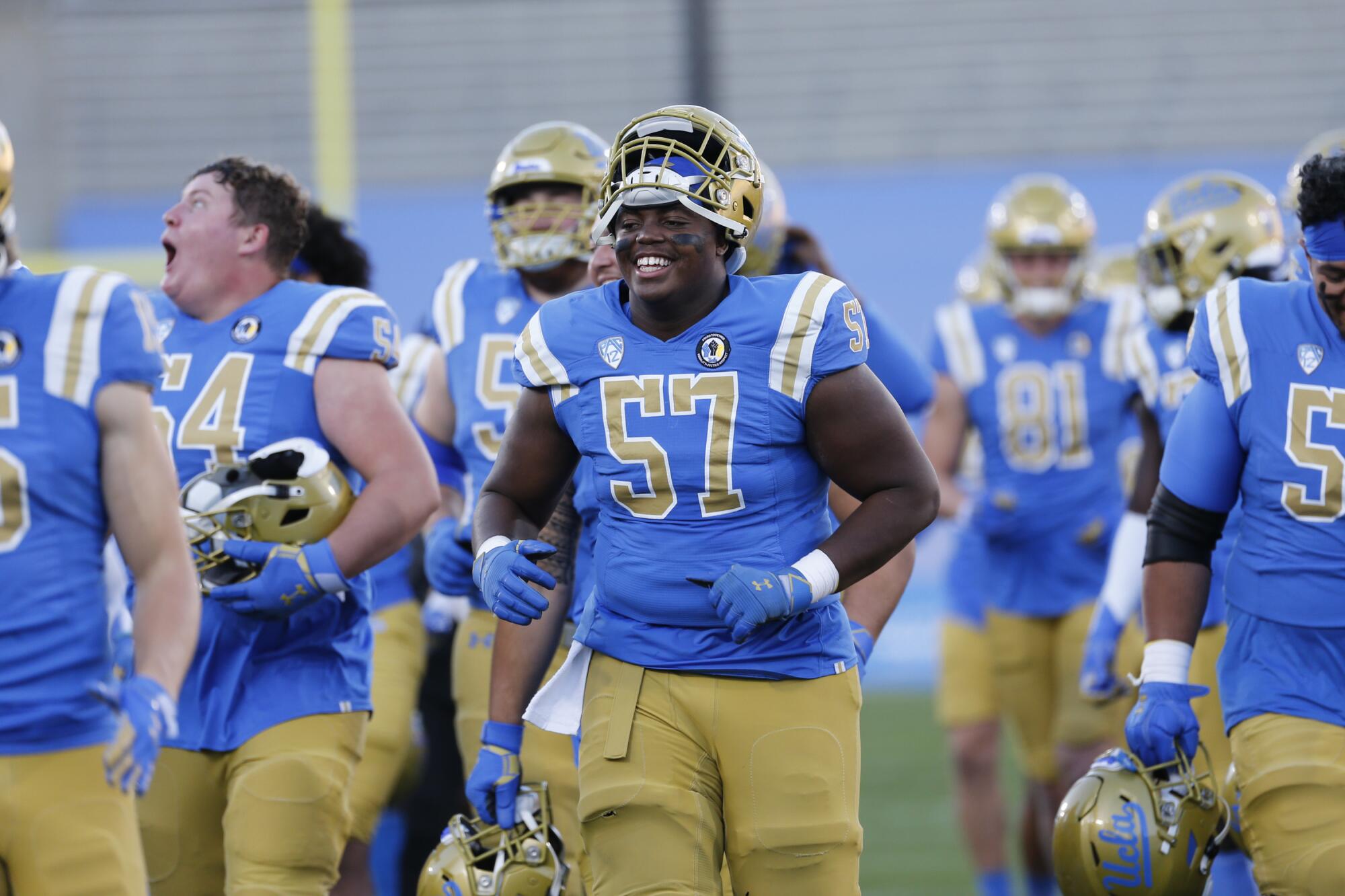
He snaps out of it after remembering this procedure is keeping him alive.
Gaines doesn’t have either of his kidneys. Cancer in the organs prompted doctors to remove them 2½ years ago after growths detected eight months earlier had become enlarged.
Three-times-a-week dialysis treatments can only sustain the 53-year-old for so long. He’ll eventually need a kidney transplant, and his rare B-positive blood type could complicate efforts to find the right match because there are fewer donors who fit that profile.
“Like most folks dealing with this,” Gaines said, “I’ve had some great days, I’ve had some tough days too.”
The strain can be felt some 2,000 miles away from the family’s suburban Milwaukee home. Jon Gaines II, an emerging force on one of the Pac-12 Conference’s sturdiest offensive lines, constantly thinks about his “Pops.” They speak nearly every other day, the son checking in on the father who sparked his love of Star Wars movies and bestowed more than a name, giving him “my nerdy side.”
“I mean, it’s always something that’s in the back of my mind,” the younger Gaines said.
The Gaines’ plight was mostly confined to friends and family before Bruins center Sam Marrazzo — with his teammate’s permission — shared the story publicly. Without any prompting, Marrazzo opened an interview with reporters last week by detailing the pain of his teammate and his father.
No. 24 UCLA is pushing to bounce back from a sobering last-minute home loss to Fresno State when the Bruins visit Stanford.
“Even when he comes to watch Jon play,” Marrazzo said of the elder Gaines, “he has to get [dialysis] out here, so I just wanted to kind of get that out there. Jon’s been here every day through the whole thing, battling through it. He’s a great guy and I feel like just to get that story out there and hopefully help his dad out a little bit in the process.”
Travel has become an ordeal. The elder Gaines attended UCLA’s victory over Louisiana State earlier this month but won’t be there Saturday when his son and the No. 20 Bruins face Arizona State in a Pac-12 South showdown.
“I’d love to come to more games,” Jon said, “but the travel process is really kind of complicated.”
Dialysis outside of his home region must be scheduled six to 10 weeks in advance to ensure availability. It’s often confined to odd hours. The day before he watched UCLA beat LSU, Gaines was in a Van Nuys dialysis center for a 2:50 a.m. session, rising with his wife, Andrea, an hour earlier inside their hotel so they could arrive on time for the nurse’s prep work.
Jon had packed what he calls his dialysis uniform — worn at home and on the road — consisting of a sweatshirt, slacks, vest, hat and blanket that he inevitably throws over himself to ward off the body chills he feels during the procedure. Headphones, an iPad and nearby TVs provide entertainment, allowing him to binge-watch shows.
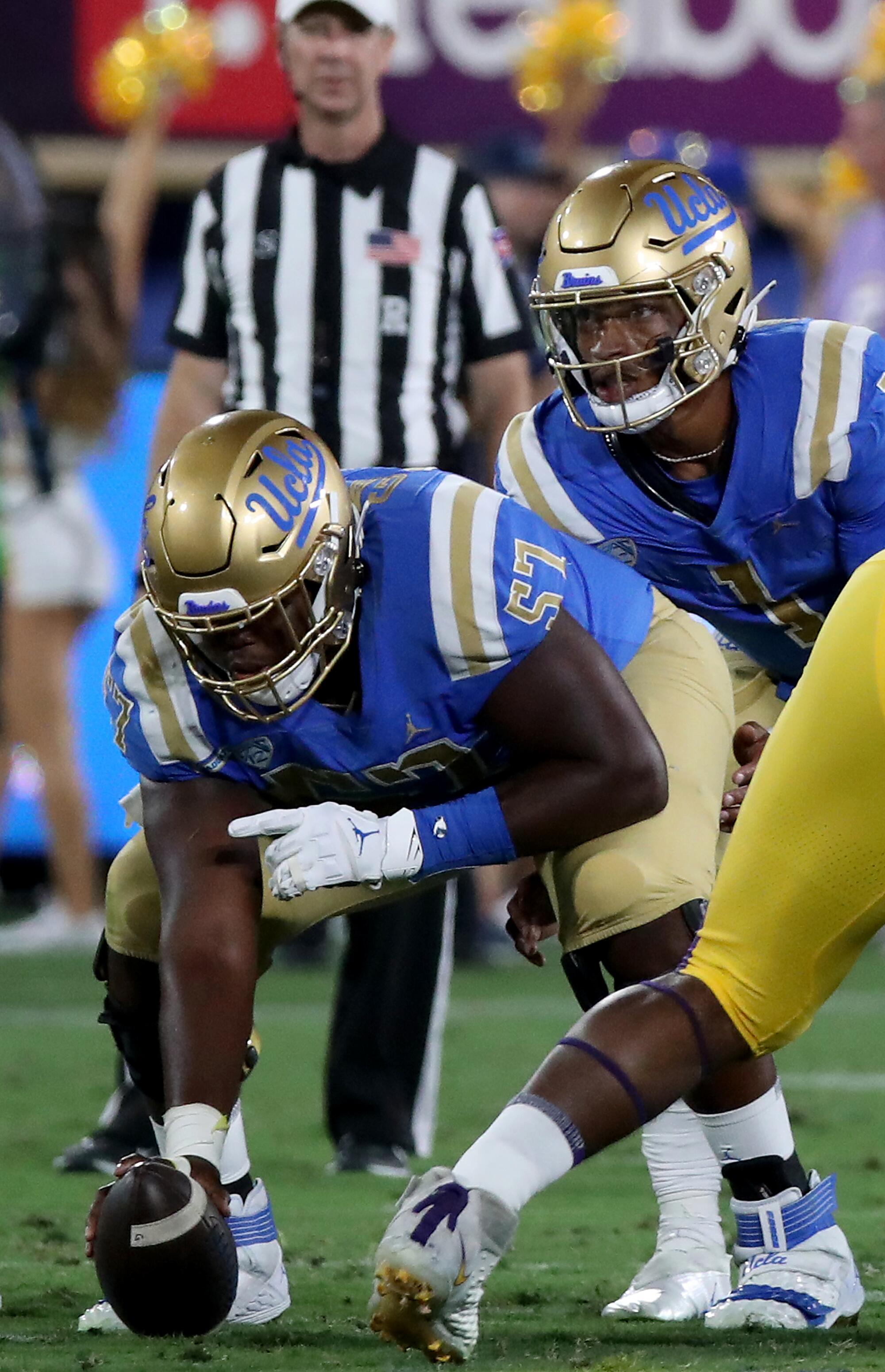
While the chair reclines to a comfortable position, sleep is almost impossible given all the bells, whistles and alarms constantly going off around him from other patients.
“In about 2½ years,” he said. “I think I’ve slept about 20 minutes in the chair.”
Jon initially kept his cancer diagnosis to himself, informing his son a few months later when he came home for Christmas break. Jon Gaines II broke down upon hearing the news and upon his return to campus, sharing his sadness with Marrazzo and offensive tackle Alec Anderson. With permission from the NCAA, UCLA arranged for Jon Gaines II to fly home to be with his father the week of his surgery the following spring.
“We are a family,” Bruins coach Chip Kelly said. “And when someone is in our family or extended family like Jon’s dad is going through something, it’s important for Jon to be there.”
The father told his son to stay strong, that these things happen, explaining “That’s life.” Jon Gaines II had the phrase tattooed under his left biceps as a reminder, smiling this week as he pulled back the sleeve of his T-shirt to reveal the words.
UCLA quarterback Dorian Thompson-Robinson practiced Monday, two days after leaving the Bruins’ victory over Stanford for one play because of an injury.
Life isn’t easy without kidneys. Jon must watch his fluid intake, restricting himself to 32 ounces of liquids per day. He cried when doctors told him he would have to give up his beloved Coca-Cola because of the phosphoric acid.
His arm used for the dialysis needles once swelled to twice its normal size because of an infiltration issue, forcing him to be hospitalized for several days. A catheter was inserted in his back to circulate his blood as part of his treatments for the next 10 weeks.
Even when dialysis goes perfectly, it has its limitations.
“Dialysis only replaces about 10% of the normal kidney function,” Jon said. “That’s good enough to live on, but who wouldn’t want 100% function?”
Jon is waiting to be placed on the active list for a transplant. Once he’s cleared by a transplant committee, he’ll be able to receive a kidney from a live donor or a cadaver, though cadaver kidneys are typically inferior to those donated by living patients.
UCLA’s gutsy victory over Stanford on Saturday might be enough to quiet speculation about coach Chip Kelly’s long-term future with the program.
His blood type might make getting a transplant more difficult in California; the wait for someone who’s B or O averages eight to 10 years for a deceased donor kidney, said Dr. Jeffrey Veale, director of the kidney transplantation exchange program at UCLA’s David Geffen School of Medicine. Ethnicity, however, is not a factor.
“Sometimes the better matches are actually people from different nationalities and religions and political parties,” Veale said, “and it’s kind of beautiful that we exchange kidneys and it’s helping someone else get off dialysis.”
Veale suggested that those who want to help can register at UCLA if they live in Los Angeles or join the National Kidney Registry if they live elsewhere. Interested donors could also sign-up for organ donation when they get their driver’s licenses.
Those willing to donate a kidney as part of the national registry will receive a voucher that could be redeemed in the future shoiuld a friend or family member need one in return. But donating a kidney is not without risk. Veale said three in 10,000 who donate a kidney could die from surgical complications.
No. 20 UCLA is pushing to build on its road win over Stanford when the Bruins host Arizona State on Saturday at the Rose Bowl.
“It’s an amazing thing,” Veale said, “to donate a kidney to another person.”
Jon expects to attend UCLA’s game against USC on Nov. 20 and said he’d probably go to the Pac-12 championship or any bowl game involving the Bruins. Winning might come with an upside beyond the team’s first winning season since 2015.
The bigger story UCLA is, the more publicity it might help the family generate and inspire people to register to become a potential donor. Father and son are united in their quest to get the word out about Jon’s need to find a match.
“I know we’re not the only people going through this,” Jon Gaines II said, “but being able to help my dad would just mean so much to my family and having him in my life is so crucial.”
More to Read
Go beyond the scoreboard
Get the latest on L.A.'s teams in the daily Sports Report newsletter.
You may occasionally receive promotional content from the Los Angeles Times.

